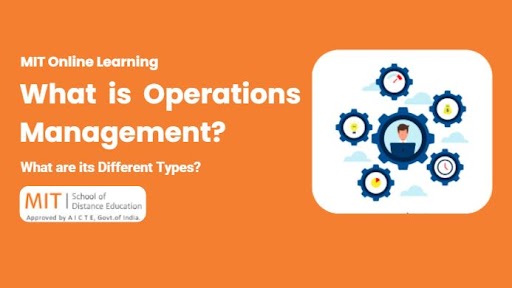
Table of Contents
- What is Operations Management and Why is it Important in Businesses?
- What are the Different Types of Operations Management?
- What are the Different Types of Career Opportunities Available in Operations Management?
- What are the Skills Required for a Career in Operations Management?
- What are the Salary Ranges for Operations Management Professionals?
- How Can One Pursue a Career in Operations Management?
- Conclusion
Operations Management is one of the most crucial aspects of business success, yet it is often overlooked compared to finance, marketing, or sales. In today’s highly competitive environment, companies can only thrive if their operations run smoothly and efficiently. Whether it’s manufacturing products, delivering services, or managing supply chains, operations management forms the backbone of organizational growth.
For students and professionals aiming to build a rewarding career in this field, pursuing a PGDM in Operations Management or enrolling in professional certification courses in operations management can be the perfect gateway. In this blog, we’ll dive deep into what operations management is, its different types, the career opportunities it offers, and how you can pursue a career in this field.
What is Operations Management and Why is it Important in Businesses?
Operations Management refers to the administration of business practices that create the highest level of efficiency possible within an organization. It focuses on planning, organizing, and supervising production, manufacturing, or service delivery processes.
At its core, operations management ensures that inputs like raw materials, technology, human resources, and finances are transformed into quality outputs — products or services — in the most cost-effective and timely way.
Importance in Businesses:
- Efficiency & Productivity: Streamlined operations reduce waste, optimize resources, and boost productivity.
- Cost Reduction: Proper management ensures minimal overhead and maximum profitability.
- Customer Satisfaction: High-quality processes lead to consistent products/services, enhancing customer trust.
- Sustainability: Modern operations management also emphasizes eco-friendly practices.
- Competitive Advantage: Companies with effective operations systems gain an edge in fast-paced markets.
This is why many professionals are choosing to pursue a PGDM in Operations Management in India to acquire expertise in managing these crucial processes.
What are the Different Types of Operations Management
Operations management is a diverse field, and businesses adopt different types depending on their goals and industries.
Here are the key types:
- Product-Based Operations Management
Focuses on the creation of physical goods. Industries like automotive, FMCG, textiles, and electronics rely heavily on this type. - Service-Based Operations Management
More relevant for healthcare, IT, education, and hospitality industries. It emphasizes customer experience and service quality. - Supply Chain Operations Management
Deals with managing the flow of goods, services, and information from suppliers to end customers. - Project Operations Management
Used in construction, engineering, and technology sectors, where projects have defined deadlines and deliverables. - Technology & Process Operations Management
Involves optimizing technological processes. Many institutions offer an Executive PGDM in Technology & Operations Management to prepare professionals for such roles. - Global Operations Management
Focuses on international supply chains, global outsourcing, and cross-border collaborations. - Sustainability Operations Management
A growing trend where businesses integrate eco-friendly practices, renewable energy, and waste reduction strategies into their operations.
If you are pursuing a distance PGDM in Operations Management, you will typically cover these types through case studies and real-world applications.
What are the Different Types of Career Opportunities Available in Operations Management?
With globalization, digitalization, and automation, the demand for skilled operations managers has grown significantly. Career opportunities are vast and span multiple industries.
Top Career Roles:
- Operations Manager – Overseeing day-to-day business activities.
- Supply Chain Manager – Managing logistics and supplier relationships.
- Project Manager – Leading cross-functional teams for project execution.
- Production Manager – Controlling manufacturing and production processes.
- Business Process Manager – Designing and optimizing workflows.
- Quality Assurance Manager – Ensuring products and services meet set standards.
- Technology Operations Manager – Handling IT infrastructure and systems efficiency.
Professionals with PGDBA in Operations Management or online certification courses in operations management in India have an added advantage, as they bring formal training and specialized knowledge to these roles.
What are the Skills Required for a Career in Operations Management?
To excel in operations management, professionals need a mix of technical, analytical, and interpersonal skills.
Essential Skills Include:
- Analytical Thinking – Ability to assess problems and develop efficient solutions.
- Leadership & People Management – Leading teams and motivating employees.
- Project Management Skills – Managing timelines, budgets, and deliverables.
- Decision-Making Abilities – Choosing optimal strategies under pressure.
- Technology Proficiency – Understanding ERP systems, automation, and AI tools.
- Financial Acumen – Managing budgets and controlling costs.
- Communication Skills – Negotiating with suppliers and collaborating across departments.
Students pursuing a PGDM in Operations Management in Mumbai or other business hubs often get hands-on exposure through internships and case studies, which helps them refine these skills.
What are the Salary Ranges for Operations Management Professionals?
Salary prospects in operations management are promising, especially for those who hold advanced degrees like PGDM in Operations Management or certifications.
- Entry-Level (0–2 years): ₹3 LPA – ₹6 LPA
- Mid-Level (3–7 years): ₹7 LPA – ₹15 LPA
- Senior-Level (8+ years): ₹18 LPA – ₹30+ LPA
Industries like IT, e-commerce, manufacturing, healthcare, and consulting often pay higher salaries to operations professionals. Candidates with an Executive PGDM in Technology & Operations Management or international certifications can expect premium packages.
How Can One Pursue a Career in Operations Management?
Starting a career in operations management involves both academic qualifications and practical exposure.
Here’s a roadmap:
1. Educational Path:
- A bachelor’s degree in business administration, engineering, or commerce is usually the first step.
- A PGDM in Operations Management in India equips students with advanced knowledge in supply chain, logistics, and project management.
2. Specialized Certifications:
- Professional Certification in Operations Management
- Online certification courses in operations management in India
- Six Sigma, Lean Management, PMP (Project Management Professional)
3. Practical Experience:
- Internships, live projects, and case studies help in gaining real-world exposure.
4. Networking and Continuous Learning:
- Attend workshops and industry events.
- Consider pursuing a distance PGDM in Operations Management if you are a working professional looking for flexibility.
With the rise of technology, many professionals also prefer PGDBA Operations Management programs to blend analytics with operations strategies.
Conclusion
Operations Management is the lifeline of every business. From manufacturing to services, from supply chains to project execution, operations managers ensure everything runs seamlessly. With growing demand across industries, a career in this field is both lucrative and stable.
Pursuing a PGDM in Operations Management, whether it’s a full-time program in Mumbai, a distance PGDM in Operations Management, or an Executive PGDM in Technology & Operations Management, can open doors to high-paying roles and long-term career growth. Additionally, opting for online certification courses in operations management in India allows working professionals to upskill and stay relevant in a competitive market.
If you are passionate about optimizing processes, leading teams, and contributing to business success, operations management might be the perfect career path for you.


